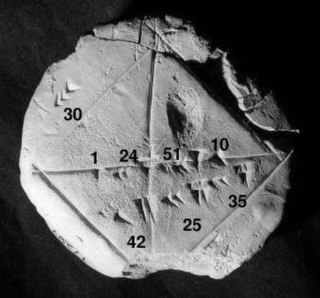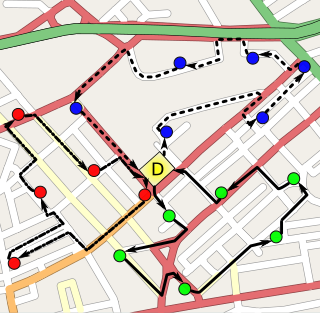Related Research Articles

Numerical analysis is the study of algorithms that use numerical approximation for the problems of mathematical analysis. It is the study of numerical methods that attempt to find approximate solutions of problems rather than the exact ones. Numerical analysis finds application in all fields of engineering and the physical sciences, and in the 21st century also the life and social sciences, medicine, business and even the arts. Current growth in computing power has enabled the use of more complex numerical analysis, providing detailed and realistic mathematical models in science and engineering. Examples of numerical analysis include: ordinary differential equations as found in celestial mechanics, numerical linear algebra in data analysis, and stochastic differential equations and Markov chains for simulating living cells in medicine and biology.
Monte Carlo methods, or Monte Carlo experiments, are a broad class of computational algorithms that rely on repeated random sampling to obtain numerical results. The underlying concept is to use randomness to solve problems that might be deterministic in principle. The name comes from the Monte Carlo Casino in Monaco, where the primary developer of the method, physicist Stanislaw Ulam, was inspired by his uncle's gambling habits.

Computational physics is the study and implementation of numerical analysis to solve problems in physics. Historically, computational physics was the first application of modern computers in science, and is now a subset of computational science. It is sometimes regarded as a subdiscipline of theoretical physics, but others consider it an intermediate branch between theoretical and experimental physics — an area of study which supplements both theory and experiment.
Computational science, also known as scientific computing, technical computing or scientific computation (SC), is a division of science that uses advanced computing capabilities to understand and solve complex physical problems. This includes

The Bulgarian Academy of Sciences is the National Academy of Bulgaria, established in 1869.
Krassimir Todorov Atanassov is a Bulgarian mathematician, Corresponding member of the Bulgarian Academy of Sciences (2012). He is best known for introducing the concepts of Generalized nets and Intuitionistic fuzzy sets, which are extensions of the concepts of Petri nets and Fuzzy sets, respectively.

Computational Engineering is an emerging discipline that deals with the development and application of computational models for engineering, known as Computational Engineering Models or CEM. Computational engineering uses computers to solve engineering design problems important to a variety of industries. At this time, various different approaches are summarized under the term Computational Engineering, including using computational geometry and virtual design for engineering tasks, often coupled with a simulation-driven approach In Computational Engineering, algorithms solve mathematical and logical models that describe engineering challenges, sometimes coupled with some aspect of AI, specifically Reinforcement Learning.
Ian Hugh Sloan AO is an Australian applied mathematician.

Computational mathematics is an area of mathematics devoted to the interaction between mathematics and computer computation.

Dimiter Skordev is a professor in the Department of Mathematical Logic and Applications, Faculty of Mathematics and Computer Science at the University of Sofia. Chairman of the department in 1972-2000. Doyen and pioneer of mathematical logic research in Bulgaria who developed a Bulgarian school in the theory of computability, namely the algebraic recursion theory. He was the 1981 winner of Acad. Nikola Obreshkov Prize, the highest Bulgarian award in mathematics, bestowed for his monograph Combinatory Spaces and Recursiveness in Them.

The Institute of Mathematics and Informatics was established in 1947 as Institute of Mathematics at the Bulgarian Academy of Sciences.

Computational statistics, or statistical computing, is the bond between statistics and computer science, and refers to the statistical methods that are enabled by using computational methods. It is the area of computational science specific to the mathematical science of statistics. This area is also developing rapidly, leading to calls that a broader concept of computing should be taught as part of general statistical education.

The Interdisciplinary Center for Scientific Computing is a scientific research institute of the Heidelberg University, Germany. It centralizes scientific activity and promotes research and work in scientific computing. Founded in 1987 by the Heidelberg University and the state of Baden-Württemberg, IWR participates in joint project and cooperations with industry in Germany as well as abroad. As a research institute with about 380 staff, IWR is considered one of the world's largest research centers for scientific computing.

Applied mathematics is the application of mathematical methods by different fields such as physics, engineering, medicine, biology, finance, business, computer science, and industry. Thus, applied mathematics is a combination of mathematical science and specialized knowledge. The term "applied mathematics" also describes the professional specialty in which mathematicians work on practical problems by formulating and studying mathematical models.

Ilya Meyerovich Sobol’ is a Russian mathematician, known for his work on Monte Carlo methods. His research spans several applications, from nuclear studies to astrophysics, and has contributed significantly to the field of sensitivity analysis.
Yordan Tabov is a Bulgarian mathematician with academic Degrees: Doctor of Pedagogical Sciences (2007), PhD in Mathematics ; he is also recipient of The Paul Erdős Award. His research interests include differential equations, geometry, didactics of mathematics, informatics and applications of mathematics and computer methods in the humanities; the focus of his research activity during the last 20 years was namely the last of the fields mentioned above.

Stefan M. Vodenicharov was president of the Bulgarian Academy of Sciences and Minister of Education, Youth and Science.

Jan S. Hesthaven is a Danish mathematician, currently Vice President for Academic Affairs at EPFL. He is Professor of Mathematics, holds the Chair of Computational Mathematics and Simulation Science (MCSS), and was appointed Vice President for Academic Affairs at EPFL. He is particularly known for contributions to the development, analysis and application of high-order accurate computational methods for time-dependent partial differential equations. He has also contributed substantially to the development of reduced order models and the application of neural networks and machine learning techniques to problems in science and engineering.
Michael Bryce Giles is a British mathematician and computer scientist. He is a Professor of Numerical Analysis at the Mathematical Institute, University of Oxford and a Fellow of Balliol College, Oxford. He is best known for developing Multilevel Monte Carlo methods.

Professor Kostadin Grozev Kostadinov is a professor of robotics at the Bulgarian Academy of Sciences and former Deputy Minister for Education in Bulgaria.
References
- ↑ "Bulgarian PM Appoints New Deputy Education Minister". Novinite . Sofia News Agency. Retrieved 24 October 2019.
- ↑ "Deputy Minister Dimov". MON.BG. Archived from the original on 2019-10-24. Retrieved 2019-10-24.
- 1 2 Dimov, Ivan. "Ivan Dimov CV". Ivan Dimov CV.
- ↑ "Scientific Chair". IICT, BAS.
- ↑ "BIS21" (PDF). CORDIS.
- ↑ "Scientific Secretary". BAS.BG.
- ↑ Dimov, Ivan (2018). Numerical Methods and Applications: 5th International Conference, NMA 2002, Borovets, Bulgaria, August 20-24, 2002, Revised Papers - Lecture Notes in Computer Science 2542 . ISBN 9783540006084.
{{cite book}}:|website=ignored (help)